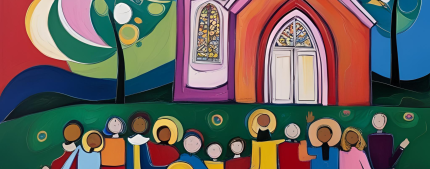Psalm 122: A call to rightness in the house of the Lord

I was glad when they said to me, “Let us go to the house of the Lord!” There should be a sense of joy when we are called into the presence of God—for as God’s children, that house is our home. However, for many, that house does not feel safe; it doesn’t feel right. Songs of ascent becomes lamentation as some dread entering a house that, through no fault of the parent, is populated by bullies. While much has been written about this phenomenon of people walking away, I wonder if we could spend some time dreaming about what rightness in the house of God might look like.
Shalom is often translated peace, but that is woefully incomplete. The word picture in the Hebrew denotes a full and robust rightness in which there is nothing lacking. One example of such a completeness is in the instructions for creating the Tent of Meeting. The root word is ḥāḇar, to unite or to bind together with clasps.[1] Pieces that were separate were to be coupled together to create a new piece, one unity out of the disparate. This, too, is how Jerusalem, the structure for the house of God, is described. It is one unit that has been comprised of many different facets. What if we, the children of the Lord, endeavored to live coupled lives with each other, viewing ourselves as part of the larger family? If we chose to lean into ḥāḇar as a part of shalom then it will not be possible to disassociate from those who carry the name of Christ, even if we don’t agree with everything they do, say, or espouse. This would radically change the way we relate to each other, thus creating a safe place of connection wherein corporately we can rightly give thanks to God.
A Church that seeks systemic justice on behalf of an entire community would close the gaps of shalom in what is commonly called peace.
In the midst of a broken world, praying for peace and security can seem like a naïve gambit. There is too much stacked against us. This may be true if you view rightness from the perspective of individual protection of one’s possessions. “God keep my family safe. God keep me safe on the roads.” However, what if security was viewed as a systemic reordering toward justice. The emphasis in the city of the Lord was concord within and without. The petition was not for the households of Jerusalem, but for the entirety of the city. It was not just for security for individual homes, but for the ramparts that protected all those inside the walls. A Church that seeks systemic justice on behalf of an entire community would close the gaps of shalom in what is commonly called peace. Seeking justice then moves from a place of fringe radical ideology to its rightful place as one of the three core acts of worship according to Micah 6:8.
Prosperity, too, has received a bad reputation in the house of God. Too often, it is conflated with greed or the shallow promises of the 'prosperity gospel,' as though material gain were the ultimate proof of divine favor. People ask the Lord for wealth or success, and if these requests go unanswered in the way they expect, they question God’s goodness or power—as though He were a mere dispenser of wishes rather than the sovereign architect of a greater purpose. Yet the fault lies not in prosperity itself, but in its misdirection. However, what if prosperity is used for collective benefit—indeed, when it is wielded as a tool for justice, generosity, and the restoration of communities—it becomes a sacred instrument, blessing the house of the Lord rather than merely enriching the individual. In this light, prayers for prosperity, especially for others, are not selfish petitions but divine collaborations; they are offered on behalf of God’s kingdom, not for personal gain but for communal flourishing.
The house of the Lord truly become a home—a place where the songs of ascent drown out the laments
Dreaming forward like this demands more than sentimental idealism; it requires systemic reordering. The Church’s strength lies in its commitment to collective justice, where no one is marginalized and all are bound together in covenant. This is the sacred work of shalom: to couple our lives so tightly that we cannot disengage from one another, even in disagreement. Then, and only then, will the house of the Lord truly become a home—a place where the songs of ascent drown out the laments, where prosperity is a shared blessing, and where the gladness of Psalm 122 is restored.
[1] Kidner, Derek. Psalm 73-150: An Introduction and Commentary. Bonds of Unity (122:3-5). Logos Bible Software 2016.
Image created in Canva.




